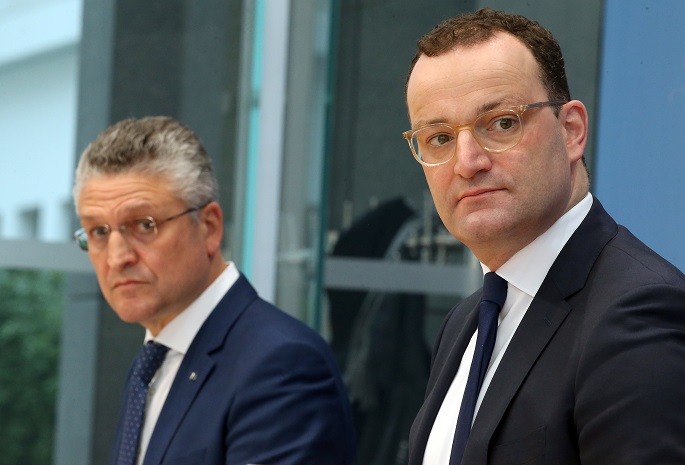German disease authority warns Covid wave hitting with 'full impact'
Published : 13 Nov 2021, 01:19
Germany's official disease control body called on Friday for far-reaching restrictions on public life to be imposed again, as the fourth wave of the coronavirus pandemic took hold, reported dpa.
The Robert Koch Institute (RKI) issued an urgent call "for larger events to be cancelled where possible or avoided, and for all other non-essential contacts to be reduced."
"It's five past 12," RKI head Lothar Wieler said. Hospitals, and particularly intensive care units were at their limits in many regions, he added. "The fourth wave is is hitting us now with full impact."
Addressing a press conference in Berlin, Health Minister Jens Spahn said urgent action needed to be taken.
"We have to do everything to break the dynamic," Spahn said. "Otherwise there will be a bitter December for the entire country." But he stopped short of recommending a lockdown.
The health minister in the caretaker Cabinet called for the restrictive "2G" rule to be introduced that allows only those who have been vaccinated or who have recovered from Covid-19 to be permitted to enter public events. It specifically excludes testing for the virus as an alternative.
Spahn also announced an increase in payments to doctors for administering jabs in an attempt to boost vaccination rates.
Earlier on Friday, the RKI posted another record high of 263.7 confirmed coronavirus cases per 100,000 people over the past 24 hours.
It marked the fifth day in a row that Germany posted a new record high figure for the seven-day incidence. Friday's figure was up from 249.1 on Thursday and 169.9 a week earlier.
German health authorities reported 48,640 new coronavirus infections to the RKI within one day, according to the latest RKI dashboard figures. This was the second highest value since the beginning of the pandemic, after a record-setting 50,196 new cases on Thursday.
According to Friday's numbers, 191 Covid-19-related deaths were recorded throughout Germany within 24 hours. A week ago there were 154 deaths.
German local authorities issued a call for a unified federal strategy, with outgoing Chancellor Angela Merkel and the premiers of the 16 states scheduled to meet only next Thursday.
Speaking to the RND news agency on Friday, the head of the local authorities association, Gerd Landsberg, called for a "binding agreement between the federal government and the states on how we get through the winter, given the current corona situation."
A campaign for booster vaccinations was part of the strategy, Landsberg said. "If possible, 20 million people should receive this vaccination by Christmas," he said.
Hospitals said they were postponing elective surgery and that intensive care units were at their limit.
"If this dynamic continues, we will soon be treating only emergency and Covid patients," Gernot Marx, head of the association for intensive and emergency medical care, told RND.
Trade unions in the medical sector said aggression was rising against doctors and nursing staff.
"Doctors are reporting hostility and threats more and more frequently in the pandemic," Susanne Johna, chair of the Marburger Bund doctors' union, told the Funke media group.
Those advocating for vaccination often experience direct threats, she said.
Germany's Federal Criminal Police Office (BKA) said recently it considers vaccination opponents or coronavirus deniers to be a "relevant risk" when it comes to attacks on vaccine centres or doctors' practices.
The BKA said for medical staff "there is a risk of being exposed to at a minimum verbal hostility and at a maximum criminal offences" such as bodily harm, in a statement to the Frankfurter Allgemeine newspaper's Sunday edition.
Johna said there has been a particular increase in the frequency and severity of verbal violence. She said she has received many threatening messages herself. "I am forced to block people on my Twitter and Facebook accounts practically every day."
Union representatives of nursing staff echo the concerns. "We are noticing patients acting more aggressively and indignantly than we have seen before," Grit Genster, a health care sector expert at service union Verdi.
She said this is particularly the case when enforcing coronavirus-related hygiene measures such as isolation, contact restrictions, mandatory mask-wearing or PCR tests.
Germany finds itself between governments. Merkel's Cabinet, currently acting in a caretaking capacity, has expressed reluctance to take major policy decisions as three-way coalition talks proceed.
The participants in those talks, the Social Democrats (SPD), who came out marginally ahead in the September elections, the Greens and the Free Democrats (FDP), have indicated that they do not intend to prolong the emergency.
They are instead planning a new infectious diseases law that will form the basis for a list of possible containment measures. Health policy is also technically in the hands of the 16 states, although Merkel has striven to coordinate a national response.
SPD health spokeswoman Sabine Dittmar said on Friday that the parties were not considering a new lockdown of the kind being imposed in the Netherlands to the west. Given the current vaccination rate, a lockdown would be difficult to implement, she said.
According to the RKI, 70 per cent of the population and 80.7 per cent of those 18 and older have had at least one vaccination.


